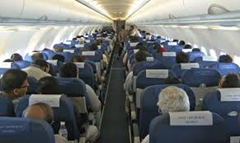Vein health when traveling
As we are entering the Summer travel season, I would like to highlight a few thoughts with regards to maintenance of vein health while traveling.
 Airplane travel poses a potential risk for venous thrombosis, or more commonly known as blood clots. This occurs due to the high altitude that the airplane takes, and even though the cabin is pressurized, this may cause the vein blood flow to thicken, leading to difficulty in recirculating to the heart. You can think of it as trying to drink a very thick milkshake through a straw. This increased thickness causes the blood cells to become sticky to the walls of the vein, which then can cause a clot. Other factors include sitting in a confined space in a narrow seat, limited movement, or keeping your legs dependent for long periods of time. Women using oral contraceptives, or hormone replacement therapy, are at a slightly higher risk.
Airplane travel poses a potential risk for venous thrombosis, or more commonly known as blood clots. This occurs due to the high altitude that the airplane takes, and even though the cabin is pressurized, this may cause the vein blood flow to thicken, leading to difficulty in recirculating to the heart. You can think of it as trying to drink a very thick milkshake through a straw. This increased thickness causes the blood cells to become sticky to the walls of the vein, which then can cause a clot. Other factors include sitting in a confined space in a narrow seat, limited movement, or keeping your legs dependent for long periods of time. Women using oral contraceptives, or hormone replacement therapy, are at a slightly higher risk.
How to prevent blood clots when flying
So what can you do to prevent blood clots; follow these guidelines.
-
Keep well hydrated, drink plenty of nonalcoholic non-caffeinated beverages. Water is the best.
-
Walk around as often as possible.
-
Ankle pumping exercises will help in recirculating the blood flow.
-
Support hose-this is probably the most important of all the options, as it physically squeezes the muscles of the foot and calf at all times allowing for more rapid venous blood flow return. To get the maximum benefit from the stockings, put them on prior to boarding the airplane. You can purchase these support hose at your local drug store chain or at the hosiery section of a department store.
How to prevent blood clots when driving
 Driving long distances or long bus rides may also pose a risk of blood clots, and besides the above guidelines, I would suggest stopping every few hours and “stretching your legs”.
Driving long distances or long bus rides may also pose a risk of blood clots, and besides the above guidelines, I would suggest stopping every few hours and “stretching your legs”.
When should you be concerned?
-
If you develop swelling of the legs soon after traveling.
-
New onset of shortness of breath or chest pain. This may be as a result of a blood clot that has traveled to the lung, more commonly known as a pulmonary embolism.
If any of the symptoms occur –go to the nearest hospital Emergency Room as soon as possible for evaluation.
I hope that these pointers will be of help, and in the words of Benjamin Franklin “an ounce of prevention is worth a pound of cure”.
For any concern about your vein health, contact the best vein specialist in NYC, Dr. Chideckel.


